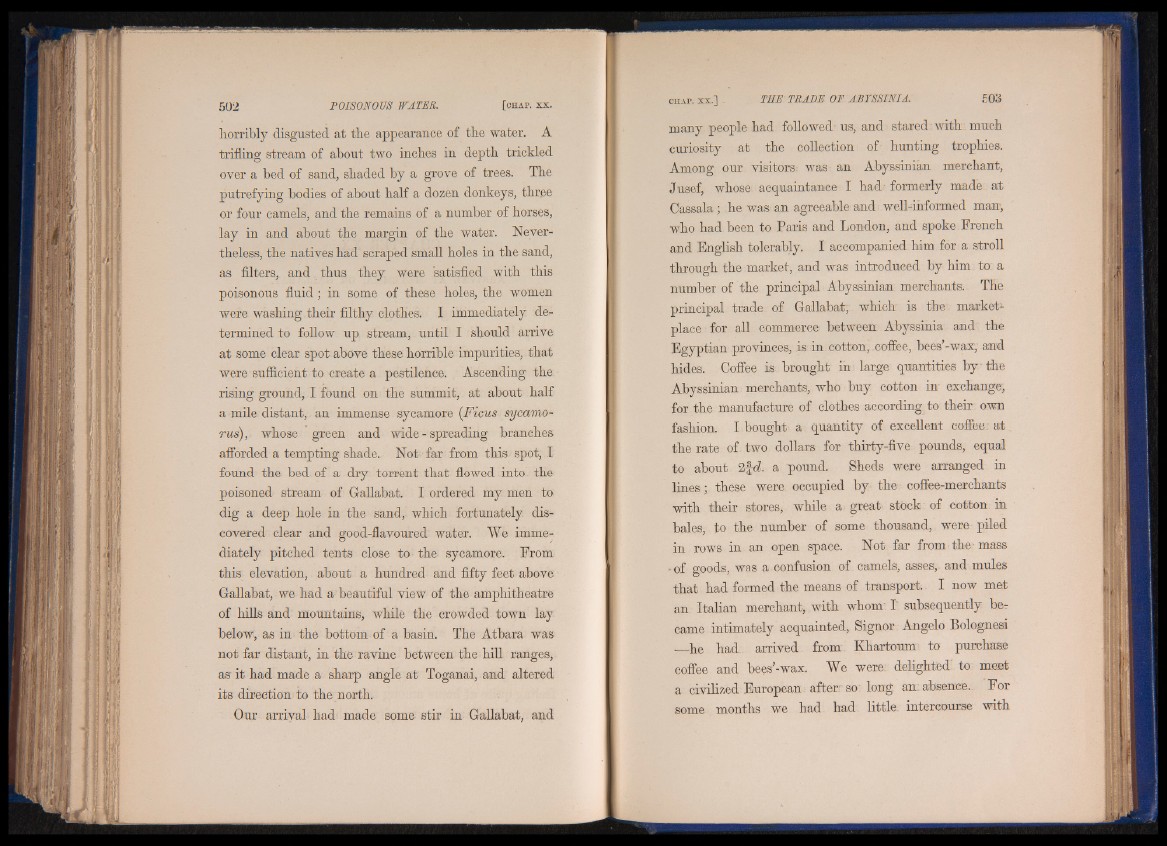
horribly disgusted at the appearance of the water. A
trifling stream of about two inches in depth trickled
over a bed of sand, shaded by a grove of trees. The
putrefying bodies of about half a dozen donkeys, three
or four camels, and the remains of a number of horses,
lay in and about the margin of the water. Nevertheless,
the natives had scraped small holes in the sand,
as filters, and thus they were satisfied with this
poisonous fluid; in some of these holes, the women
were washing their filthy clothes. I immediately determined
to follow up stream, until I shoidd arrive
at some clear spot above these horrible impurities, that
Avere sufficient to create a pestilence. Ascending the
rising ground, I found on the summit, at about half
a mile distant, an immense sycamore (Ficus sycamo-
rus),, whose green and wide - spreading branches
afforded a tempting shade. Not far from this spot, I
found the bed of a dry torrent that flowed into the
poisoned stream of Gallabat. I ordered my men to
dig a deep hole in the sand, which fortunately discovered
clear and good-flavoured water. We immediately
pitched tents close to the sycamore. From
this elevation, about a hundred and fifty feet above
Gallabat, we had a beautiful view of the amphitheatre
of hills and mountains, while the crowded town lay
below, as in the bottom of a basin. The Atbara was
not far distant, in the ravine between the hill ranges,
as it had made a sharp angle at Toganai, and altered
its direction to the north.
Our arrival had made some stir in Gallabat, and
many people had followed us, and stared with much
curiosity at the collection of hunting trophies.
Among our visitors- was- an Abyssinian merchant,
Jusef, whose acquaintance I had formerly made at
Cassala ; he was an agreeable and well-informed man,
who had been to Paris and London, and spoke French
and English tolerably. I accompanied him for a stroll
through the market, and was introduced by him to: a
number of the principal Abyssinian merchants. The
principal trade of Gallabat, which is the marketplace
for all commerce between Abyssinia and the
Egyptian provinces, is in.cotton,.coffee, bees’-wax, and
hides. Coffee is brought in large quantities by the
Abyssinian merchants, who buy cotton in' exchange;
for the manufacture of clothes according to their own
fashion. I bought a quantity of excellent coffee at
the rate of two dollars for thirty-five pounds, equal
to about 2fd. a pound. Sheds were arranged in
lines ; these were, occupied by the coffee-merchants
with their stores, while a great stòck of cotton in
bales, to the number of some thousand, were piled
in rows in an open space. Not far from the mass
-of goods, was a confusion of camels, asses, and mules
that had formed the means of transport. I now met
an Italian merchant, with whom T subsequently ber
came intimately acquainted, Signor Angelo Bolognesi
—he had arrived from. Khartoum to purchase
coffee and bees’-wax. We were: delighted to meet
a civilized European afterr so long an: absence. For
some months we had had little, intercourse with